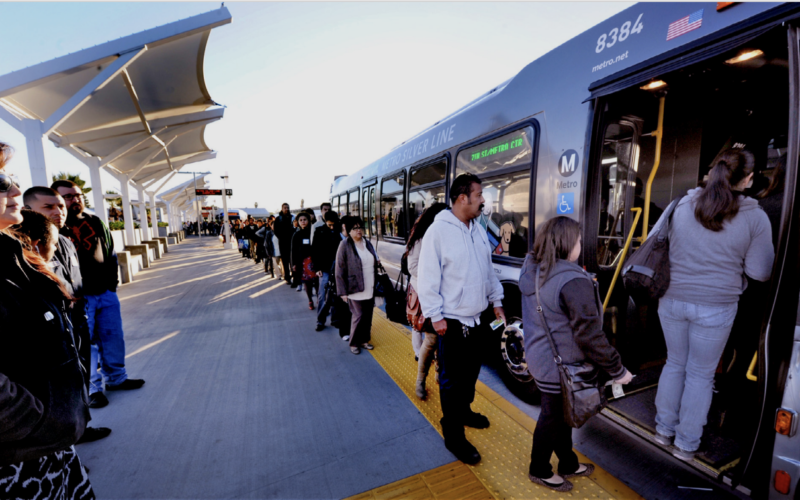
TransitCenter has written much about the unique challenges facing women in the transportation industry. A multitude of data shows that regardless of how women work, the professional world continues to devalue them – Black women and non-Black women of color in particular. Pervasive issues of gender-based pay inequality, restrictive childcare policies, and the underrepresentation of women at various levels of the workforce — along with sexual harassment — remain largely unchanged.
When we began the Women Changing Transportation program in 2018, we hoped to create a new space for women and femmes in the field – a space that acknowledged the need for professional development and networking opportunities, but also acknowledged the wholeness and range of women’s experiences in transportation. A space where women could not only vent but also build community and work collectively to address the impacts of white cis-male decision-making in the field.
Over the course of 2019 (and one final meet-up in 2020), we connected 34 women working across the transportation sector (from public agencies, private companies, and advocacy organizations, representing a range of roles within such organizations) through in-person meet-ups and offline conversation. The program was centered on one-on-one mentorship, but the in-person gatherings provided an opportunity to build the supportive network we’d envisioned.
The utopia we imagined was far from perfect. In our desire to connect women as a whole, we missed the need to ground the group in the differences that shape our experiences. We missed the need to center the voices of Black and brown women, who cannot extricate that identity from what it means to be a woman working in the transportation space, and moving in the world. We missed opportunities to interrogate how our group, as driven as we were to fix a flawed field, were also complicit in white supremacy culture.
We’re thankful and indebted to the women in this program who held us accountable for those missed opportunities, and believed in the vision of the program enough to help shape it and the community we formed. We continue to learn and evolve our understanding of what a supportive space for women is – a process deeply co-informed by the members of our cohort.
At the final convening of the first year of the Women Changing Transportation program, we asked the members of the cohort to reflect on their year together, the current state and future of transportation, and their experiences as women working in the field. We memorialized their thoughts on video and will share some of those short videos over the next few months.
As we look back on their reflections in this moment, it’s clear how salient and ever-present the topics are. The road to dismantling oppressive structures and creating space for new thinking is obviously a long one, but the thoughts the women share in these videos also bring hope for the future.
In this video, Amar Cid and Dr. Destiny Thomas discuss the need for the planning and transportation fields to reckon with the harm they’ve caused in Black and brown communities, the barriers Black and brown women face in showing up as their authentic selves in this field, and the importance of supportive and safe environments that allow for this authenticity:
Here, Laura Chu Wiens and Kimberly Ford talk about the responsibility of being a white-passing woman in the planning and transportation space, the importance of working in allyship with justice organizations like Black Lives Matter and immigrant rights groups, and setting a vision for agencies and local government:
And here: Tiffany Ann Taylor and Naomi Iwasaki discuss the isolation and responsibility of being the only Black woman or woman of color in the room, the challenges of not seeing yourself represented in spaces of leadership, and the responsibility of being a non-Black POC in spaces of anti-Blackness:
The continued violence against Black, brown, and queer bodies, predominantly at the hands of police, and the subsequent protests for justice over the past few months have forced a reckoning in the planning and transportation space. Public officials and private practitioners must grapple with the inequities exposed by COVID-19 and the harm of anti-Blackness in decision-making. Transportation policy makers, advocates, and consultants are reevaluating their understanding of and commitment to equity and justice.
What is true is that there are and have been so many people working to dismantle the status quo both within transit agencies, and as external advocates. It’s incumbent on the field to elevate this work, and to create space for these voices in positions of leadership.
The WCT group’s varied experiences brought diverse perspectives about what is needed in transportation right now — while the adoption of new practices (using the latest trend in data or technology, for example) and more funding are often called for to modernize and improve transit, what the group saw as the major challenge to transit is the lack of change in leadership.
Without new and diverse voices in leadership — women and specifically Black women and women of color — the transportation sector will continue to stagnate, failing to address inequity and injustice, missing opportunities for innovation, and failing to meet the needs of riders.
The work that women — Black women and women of color in particular — are doing to elevate the needs of Black and brown communities and to call out the anti-Blackness, racism, ableism, and gender bias entrenched in the field is gaining overdue recognition and attention. These are important stories to tell, and we’re committed to doing our part to share this work, in recognition of the time and sacrifice involved, but also as a model for what is possible when we think critically about the change this field needs.
 “Who Rules Transit?” Chronicles the Gulf Between “Who Decides” and “Who Rides” at Transit Agencies
“Who Rules Transit?” Chronicles the Gulf Between “Who Decides” and “Who Rides” at Transit Agencies
Our latest report reveals a yawning gap between the demographics of transit riders – primarily women and people of color – and leadership at transit agencies – primarily white men.
Read More Introducing Subtext, a Zine from Women Changing Transportation
Introducing Subtext, a Zine from Women Changing Transportation
We’re thrilled to release the first issue of Subtext, a zine created by members of the Women Changing Transportation cohort.
Read More